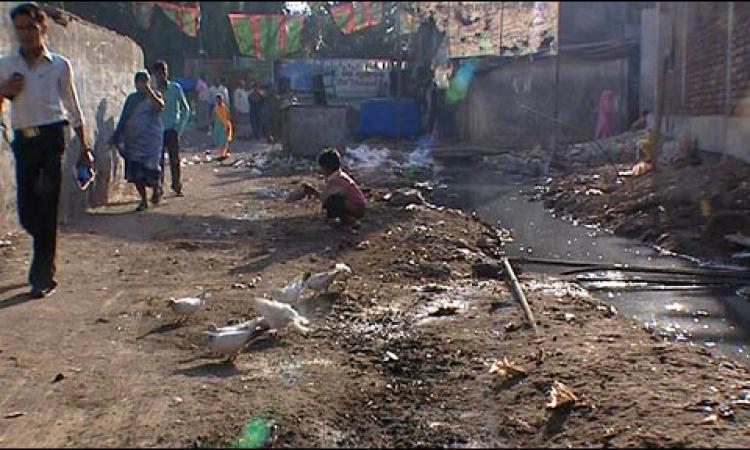
Welfare schemes not of much use to urban slums
A survey by the National Sample Survey Organisation has revealed that over 30% urban slums across India have no toilets or drainage facilities. This is inspite of fund allocation for the same from Central government welfare schemes such as the Jawaharlal Nehru National Urban Renewal Mission, Rajiv Awas Yojana and other state government schemes. The good news however is that 71% of all slums in the country have taps as a major source of drinking water.
Trench construction in close proximity of the historic Golconda fort
The Hyderabad Metropolitan Water Supply and Sewerage Board has been digging a trench within the prohibited precincts of the Golconda Fort, the city's main tourist attraction. The Board intends to lay a pipeline close to the monument protected by the Archaeological Survey of India. The pipeline is intended to improve water supply in the Golconda area as and when the Krishna Phase III materialises. The ASI, however, has not objected so far.
99 illegal dyeing units in Tirupur
The Tamil Nadu Pollution Control Board unearthed 99 illegally operating dyeing and bleaching units in the industrial town of Tirupur. A High Court order in 2011 had directed closure of all knitwear units in Tirupur for discharging untreated effluents and polluting the river Noyyal. According to the Board officials, these units were operating in violation of the High Court order. A farmers’ body that filed the application in the Court asked that the common effluent treatment plants and individual effluent treatment plants should not be allowed to operate unless they achieved zero liquid discharge in the treatment process.
Capital's regional planning board identifies only 12 lakes in its regional plan
The National Capital Region's Planning Board has listed only 12 lakes in the city as against thousands identified in the National Wetland Inventory and Assessment of the Environment Ministry. Environmentalists fear that if the draft plan is approved, it would mean that all these wetlands will no longer be protected and will become open to land sharks. The Indian National Trust for Art and Cultural Heritage has raised objection to the Plan citing that it does not mention steps to demarcate water bodies and their catchments, groundwater recharge zones and floodplains.
Whale shark radio-collared in Gujarat
World's biggest fish, the whale shark, which is an annual visitor to the Gujarat coast, was succesfully satellite tagged in the coastal town of Sutrapada. The fish migrates to Gujarat in winters, travelling thousands of miles from Australia. The tagging was done when a female whale shark was accidently caught in a fishing net by members of a wildlife NGO. According to experts, tagging the fish will help explore new facts and data on whale shark habitats and provide precise information on migratory patterns, breeding and survival of the fish off the Gujarat coast
This is a weekly roundup of important news from December 29, 2013- January 4, 2014. Also read last week's policy matters updates.
/articles/despite-government-funding-only-30-urban-slums-have-toilets